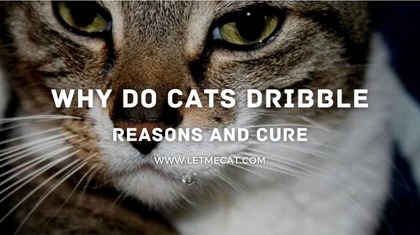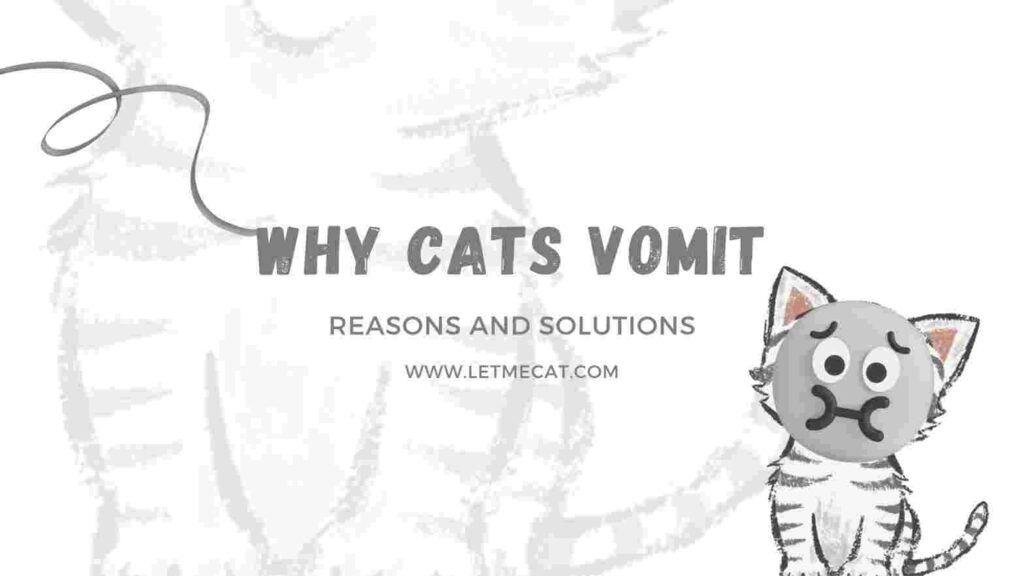Let’s uncover the mystery of why do cats dribble in this detailed guide. Cats are adorable and cuddly, but their behavior can be perplexing at times. Drooling is one of these behaviors. While it may appear strange, dribbling in cats is a common occurrence that is usually not causing concern.
However, it is critical to understand why this occurs and when you should be concerned.
Understanding Cat Dribbling
Dribbling in cats can occur for a number of reasons, including excitement, stress, and medical conditions.
When a cat gets excited, its salivary glands produce more saliva, causing it to drool.
When a cat is stressed, its salivary glands can go into overdrive, resulting in dribbling.
Dribbling in cats can also be caused by medical conditions such as dental problems, gum disease, and mouth infections.
Drooling in these cases indicates that something is wrong, and your cat may require veterinary care.
Why do Cats Dribble: Common Causes
- Excitement
- Stress
- Dental problems
- Gum disease
- Mouth infections
- Certain medications
- Nausea
- Kidney issues
- Ingested a poisonous substance
It’s also worth noting that cats can dribble as a result of certain medications, such as pain relievers. If your cat is on medication and is drooling excessively, consult your veterinarian.
Cat Dribbles due to Kidney Issues
Cat dribbling can also indicate kidney disease in cats. The kidneys are in charge of removing waste from the blood and producing urine.
When the kidneys are not working properly, they are unable to remove waste efficiently, causing toxins to accumulate in the bloodstream. This can result in uremia, a condition that causes a variety of symptoms, including dribbling.
Dribbling may be accompanied by other symptoms in cats with kidney problems, such as:
- Increased thirst
- Decreased appetite
- Weight loss
- Changes in the frequency and volume of urination
If you suspect your cat has kidney problems, take them to a veterinarian for a diagnosis. Medication, special diets, and fluid therapy may be used to treat kidney problems in cats.
Early detection and treatment can help your cat’s quality of life while also slowing the progression of kidney disease.
Ingested a Poisonous Substance
Cats are curious creatures who enjoy exploring their surroundings, but their curiosity can sometimes lead to dangerous situations, such as ingesting a poisonous substance.
If your cat has ingested a toxic substance, you must act quickly to get them the care they require. Dribbling or drooling is one of the symptoms of cat poisoning.
If you suspect your cat has consumed a poisonous substance, seek veterinary care immediately. To remove the toxic substance, your veterinarian may induce:
- Vomiting
- To absorb any remaining toxins, use activated charcoal.
- Provide other supportive treatments, such as IV fluids, to help flush the toxins from your cat’s system
The sooner you get your cat treated, the better his or her chances of recovering completely.
If you have any concerns or questions about your cat dribbling as a result of ingesting a poisonous substance, consult a veterinarian.
Cat Dribbling: A Symptom of Dental Disease
See the below points:
- Cats frequently suffer from dental disease.
- Can cause a variety of symptoms, including dribbling
- In cats with dental disease, gums, and teeth may become inflamed and infected. It was painful and uncomfortable.
- Drooling or dribbling may occur, particularly when eating or drinking.
- Drooling may be accompanied by other symptoms such as bad breath, a loss of appetite, and behavioral changes.
- It is critical to take your cat to the veterinarian for a diagnosis. A veterinarian can perform a thorough oral exam, check the health of the teeth and gums, and make treatment recommendations.
- Cleaning, scaling, polishing, extractions, and antibiotics are all treatment options.
- To maintain good oral health and prevent future dental problems, your veterinarian may also recommend home care, such as brushing your teeth.
- If your cat is drooling, it could be a sign of a more serious health problem, so seek medical attention right away.
When Should You Be Concerned About Cat Dribbling?
While dribbling in cats is usually not a cause for concern, there are times when it can indicate a more serious problem.
If your cat is dribbling excessively, if it is accompanied by other symptoms such as vomiting, or if the dribbling is causing discomfort for your cat, it is best to consult a veterinarian.
Curing Cat Dribbling: Understanding the Causes and Treatment Options
Understanding the root cause of your cat’s dribbling is critical for determining the best course of treatment. If your cat is drooling, you should take them to a veterinarian for a diagnosis.
Your veterinarian can recommend the best course of treatment once the underlying cause of your cat’s dribbling has been identified. Some options for treatment may include:
- Medication
- Special diets
- Fluid therapy
- Dental care
- Surgery may be required in some cases to correct the problem
Your veterinarian will collaborate with you to create a personalized treatment plan that takes your cat’s unique needs and health status into account.
Reducing Cat Dribbling at Home: Simple Steps to Help Your Feline Friend
In addition to medical treatment, there are some things you can do at home to help your cat stop dribbling. This may include providing:
- A balanced and nutritious diet
- Plenty of fresh water
- Clean and comfortable sleeping environment
You can help your cat overcome dribbling and live a happy, healthy life by working closely with your veterinarian and following their recommended treatment plan.
Conclusion
Dribbling is a common behavior in cats that can be caused by a variety of factors such as excitement, stress, and medical conditions. While it is usually nothing to be concerned about, it is important to recognize when it may indicate a more serious problem.
Consult a veterinarian if your cat is dribbling excessively or if the dribbling is accompanied by other symptoms.
We hope you found this in-depth guide on why do cats dribble useful. Please feel free to ask any additional questions. We’d be delighted to respond to all of them. Thank you for taking the time to read it.
FAQs About Cat Dribbling
Q1. Is dribbling in cats normal?
Q2. What causes cats to dribble?
Q3. Can medication cause cats to dribble?
Q4. Is excessive dribbling in cats a sign of a problem?
Q5. Should I be concerned if my cat is dribbling?
Q6. Can dental problems cause cats to dribble?
Q7. Can stress cause cats to dribble?
Conclusion
Dribbling is a common behavior in cats that can be caused by a variety of factors such as excitement, stress, and medical conditions. While it is usually nothing to be concerned about, it is important to recognize when it may indicate a more serious problem.
Consult a veterinarian if your cat is dribbling excessively or if the dribbling is accompanied by other symptoms.
We hope you found this in-depth guide on why do cats dribble useful. Please feel free to ask any additional questions. We’d be delighted to respond to all of them. Thank you for taking the time to read it.



